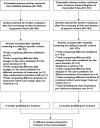Effectiveness and safety of short vs. long duration of antibiotic therapy for acute bacterial sinusitis: a meta-analysis of randomized trials
- PMID: 19154447
- PMCID: PMC2670373
- DOI: 10.1111/j.1365-2125.2008.03306.x
Effectiveness and safety of short vs. long duration of antibiotic therapy for acute bacterial sinusitis: a meta-analysis of randomized trials
Abstract
What is already known about this subject: Treatment guidelines generally support that a 10-14-day antibiotic regimen should be administered to uncomplicated acute bacterial sinusitis patients. However, the level of evidence for such a recommendation is rather weak. Treatment of such duration may have disadvantages compared with a shorter duration but equally effective regimen, including the promotion of bacterial drug resistance, poorest patient compliance, higher toxicity, and a greater overall economic burden.
What this study adds: The findings of this meta-analysis suggest that short-course antibiotic treatment has similar effectiveness to longer-course treatment for patients with acute uncomplicated bacterial sinusitis, when treatment is warranted. However, we should underscore the importance of the clinician's own assessment, so that antimicrobial therapy should not inappropriately be curtailed in a patient not adequately responding to the regimen administered. We sought to evaluate the effectiveness and safety of short-course antibiotic treatment for acute bacterial sinusitis (ABS) compared with longer duration treatment. We performed a meta-analysis of randomized controlled trials (RCTs), identified by searching PubMed and the Cochrane Central Register of Controlled Trials. We included RCTs that compared short-course (up to 7 days) vs. long-course therapy (> or =2 days longer than short-course), with the same antimicrobial agent, in the same daily dosage, for patients with ABS. Twelve RCTs (10 double-blinded) involving adult patients with radiologically confirmed ABS were included. There was no difference in the comparison of short-course (3-7 days) with long-course treatment (6-10 days) regarding clinical success [12 RCTs, 4430 patients, fixed effect model (FEM), odds ratio (OR) 0.95, 95% confidence interval (CI) 0.81, 1.12]; microbiological efficacy; relapses; adverse events (10 RCTs, 4172 patients, random effects model, OR 0.88, 95% CI 0.71, 1.09); or withdrawals due to adverse events. In the sensitivity analysis comparing 5- vs. 10-day regimens, clinical success was similar, although adverse events were fewer with short-course treatment (5 RCTs, 2151 patients, FEM, OR 0.79, 95% CI 0.63, 0.98). Although antibiotics for acute sinusitis should be reserved for select patients with substantial probability of bacterial disease, accurate clinical diagnosis is often difficult to attain. Short-course antibiotic treatment had comparable effectiveness to a longer course of therapy for ABS. Shortened treatment, particularly for patients without severe disease and complicating factors, might lead to fewer adverse events, better patient compliance, lower rates of resistance development and fewer costs.
Figures




Similar articles
-
Short- versus long-course antibiotic therapy for acute pyelonephritis in adolescents and adults: a meta-analysis of randomized controlled trials.Clin Ther. 2008 Oct;30(10):1859-68. doi: 10.1016/j.clinthera.2008.10.007. Clin Ther. 2008. PMID: 19014841
-
A meta-analysis of randomized, controlled trials comparing short- and long-course antibiotic therapy for urinary tract infections in children.Pediatrics. 2002 May;109(5):E70-0. doi: 10.1542/peds.109.5.e70. Pediatrics. 2002. PMID: 11986476
-
Short versus long duration of antibiotic therapy for bacterial meningitis: a meta-analysis of randomised controlled trials in children.Arch Dis Child. 2009 Aug;94(8):607-14. doi: 10.1136/adc.2008.151563. Arch Dis Child. 2009. PMID: 19628879 Review.
-
Effectiveness and safety of short-course vs long-course antibiotic therapy for group a beta hemolytic streptococcal tonsillopharyngitis: a meta-analysis of randomized trials.Mayo Clin Proc. 2008 Aug;83(8):880-9. Mayo Clin Proc. 2008. PMID: 18674472
-
Short-course therapy for acute sinusitis: how long is enough?Treat Respir Med. 2004;3(5):269-77. doi: 10.2165/00151829-200403050-00001. Treat Respir Med. 2004. PMID: 15606217 Review.
Cited by
-
Upper respiratory infections.Prim Care. 2013 Sep;40(3):757-70. doi: 10.1016/j.pop.2013.06.004. Epub 2013 Jul 12. Prim Care. 2013. PMID: 23958368 Free PMC article. Review.
-
Antibiotic duration for common bacterial infections-a systematic review.JAC Antimicrob Resist. 2025 Jan 29;7(1):dlae215. doi: 10.1093/jacamr/dlae215. eCollection 2025 Feb. JAC Antimicrob Resist. 2025. PMID: 39881797 Free PMC article. Review.
-
Advances in optimizing the prescription of antibiotics in outpatient settings.BMJ. 2018 Nov 12;363:k3047. doi: 10.1136/bmj.k3047. BMJ. 2018. PMID: 30420401 Free PMC article. Review.
-
Rapid recommendations: Updates from 2021 guidelines: part 1.Can Fam Physician. 2022 Sep;68(9):664-666. doi: 10.46747/cfp.6809664. Can Fam Physician. 2022. PMID: 36100372 Free PMC article. No abstract available.
-
Guidelines for the Antibiotic Use in Adults with Acute Upper Respiratory Tract Infections.Infect Chemother. 2017 Dec;49(4):326-352. doi: 10.3947/ic.2017.49.4.326. Infect Chemother. 2017. PMID: 29299900 Free PMC article. Review.
References
-
- Schappert SM, Burt CW. Ambulatory care visits to physician offices, hospital outpatient departments, and emergency departments: United States, 2001–02. Vital Health Stat 13. 2006;159:1–66. - PubMed
-
- Benninger MS, Payne SC, Ferguson BJ, Hadley JA, Ahmad N. Endoscopically directed middle meatal cultures versus maxillary sinus taps in acute bacterial maxillary rhinosinusitis: a meta-analysis. Otolaryngol Head Neck Surg. 2006;134:3–9. - PubMed
-
- Agence Francaise de Securite Sanitaire des Produits de Sante. Systemic antibiotic treatment in upper and lower respiratory tract infections: official French guidelines. Clin Microbiol Infect. 2003;9:1162–78. - PubMed
Publication types
MeSH terms
Substances
LinkOut - more resources
Full Text Sources
Medical

